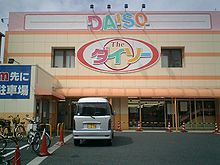100-yen shop


100-yen shops (100円ショップ, hyaku-en shoppu) are common Japanese shops in the vein of American dollar stores. Stocking a variety of items from clothing to stationery, housewares to food, each item is priced at precisely 100 yen, which is considered attractive to Japanese consumers because it can be paid for with a single 100-yen coin. However, the current Japanese consumption tax of 8% (food and drinks) or 10% (other items) is also added, making a 100-yen purchase actually cost 108 or 110 yen.[1] Larger items, like furniture and tools, may also cost more yet are still relatively affordable, usually costing less than 1000 yen.
The four major chains are Daiso, Seria, Watts, and Can Do, which combined have over 5,500 locations across Japan as of 2012.[2] A variation of the 100-yen shops are 99-yen shops.[3] Daiei also operates 88-yen stores. Some shops, such as Lawson 100, specialize in certain items, such as groceries or natural goods, but this is less common than the variety store model.[4]

The concept of stores that sell products at a uniformly low price dates back to the Edo period, when shops selling items for 19 mon and later 38 mon were popular.[5][6] By the Meiji period, this had expanded to clothing stores and food stands, and stores selling only 1-yen items were not uncommon[7] The first 100-yen shop in its modern form was opened in 1985 in Kasugai, Aichi prefecture by Akira Matsubayashi, the founder of the company Life Standard. It was called '100-yen Shop' (100円ショップ).[8] This model was eventually adopted by Hirotake Yano, the founder of Daiso Industries Co. Ltd., who opened the first Daiso store in 1991. Today, there are over 2,800 Daiso stores throughout Japan, with 20-30 new stores opening every month.[9][10][11] One of the largest 100-yen shops is the Daiso in the Tokyo neighborhood of Harajuku. It spans four stories and over 10,500 square feet (980 m2).[12]
Similar shops have opened around other parts of Asia as well, some operated by Japanese companies such as Daiso, which now has branches in 25 countries outside of Japan.[13] In Hong Kong, department stores have opened their own 10-dollar-shops (JPY140) to compete in the market, thus there are now "8-dollar-shops" (JPY110) in Hong Kong, in order to compete with those lower prices.[citation needed]
100-yen shops are able to keep prices down by purchasing goods internationally and in bulk. These goods come from countries with lower production costs, namely China and Thailand.[1][14]
See also
[edit]References
[edit]- ^ a b "100 Yen Shop",japan-guide.com, 15 February 2018
- ^ Suzuki, Mami (August 24, 2015). "Seria: Japan's Best 100 Yen Shop". Tofugu.
- ^ "In Japan, the 99 Yen Store Becomes a Retailing Force". Convenience Store News. 13 July 2005. Retrieved 15 February 2018.
- ^ "Stores in Japan". lawson.jp. Retrieved 15 February 2018.
- ^ "十九文屋(ジュウクモンヤ)とは".
- ^ 中江, 克己. お江戸の意外な商売事情 リサイクル業からファストフードまで.
- ^ ISMPublishingLab (2013). "江戸っ子の品質が生んだ食料品の百円ショップ". 時代を変えた江戸起業家の商売大辞典. Japan: ゴマブックス. ASIN B00FKX8B4Y.
- ^ 100円ショップ大図鑑:生産と流通のしくみがわかる:安さのヒミツを探ってみよう. PHP研究所. 2005. ISBN 4569685587.
- ^ "History". Daiso Global. Archived from the original on 21 February 2018. Retrieved 15 February 2018.
- ^ "Corporate Profile". Daiso Global. Archived from the original on 3 April 2019. Retrieved 15 February 2018.
- ^ "Corporate Information". Daiso (Australia). Retrieved 15 February 2018.
- ^ "Bargain hunting at Japan's 100-yen stores". LA Times. 27 June 2010. Retrieved 15 February 2018.
- ^ "Japan's ¥100 Shops". nippon.com. 2016-04-23. Retrieved 2018-08-22.
- ^ higuchi. "Logistics │ About DAISO │ DAISO JAPAN". www.daisoglobal.com (in Japanese). Archived from the original on 2018-09-19. Retrieved 2018-08-22.
